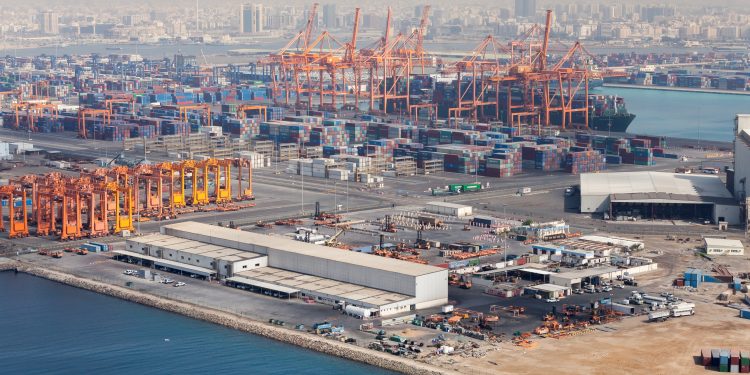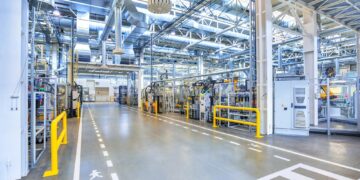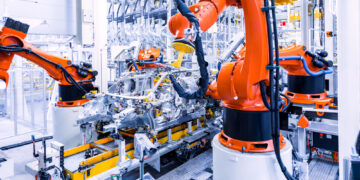Saudi Arabia is charting a course toward economic transformation and societal improvement by aligning with the principles of the Fourth Industrial Revolution, as it commenced with the launch of its Vision 2030 plan on April 25, 2016. This blueprint, featuring the National Industrial Development and Logistics Program (NIDLP), is designed to drive domestic high-growth sectors and attract foreign capital, while integrating advanced technologies across various industries.
Expounded by Harsh Kumar, Shipsy’s chief strategy officer and co-founder, Saudi Arabia is strategically poised to become a central hub for Industry 4.0, optimizing its bountiful energy and geographical advantages to establish sophisticated supply chain systems.
The Kingdom’s investment in technology and fostering an innovative atmosphere are laying the foundation for a knowledge-based economy ready to tackle the digital era’s challenges and opportunities. Saudi Arabia, being a part of the G20, is cultivating a progressive business environment that bolsters entrepreneurship and technological progression.
Innovation centers, startup accelerators, and research entities like the Saudi Venture Capital Co., King Abdullah University of Science and Technology, and King Abdulaziz City for Science and Technology are playing pivotal roles in developing leading-edge technologies.
By encouraging a culture of innovation and entrepreneurship, Saudi Arabia is equipping its population to leverage the Fourth Industrial Revolution’s benefits and contribute to national prosperity. Kumar underscores the potential for Saudi Arabia to adopt cutting-edge manufacturing and supply chain technologies, including AI, automation, IoT, and robotics, to augment efficiency and meet increasing demand.
A supportive policy framework, investment in education, and partnerships with global tech giants are critical,
Kumar suggests, affirming that international collaborations are key to importing best practices and customizing innovative solutions that could establish Saudi Arabia as a leader in technological and supply chain excellence.
According to Ericsson, Saudi Arabia boasts an impressive 98 percent internet penetration rate among its populace. This digital readiness is propelling the nation toward transformative initiatives like the Digital Government Authority and Vision 2030, which promise to invigorate smart city projects, digital healthcare, infrastructure upgrades, and autonomous supply chain technologies.
Kumar anticipates that by 2025, the e-commerce sector is expected to surpass $13 billion, presenting vast opportunities to enhance warehouse and delivery operations with AI. Additionally, the government’s initiative to bolster digital skills for 100,000 students by 2030 is indicative of its commitment to education and technological advancement.
Within the Saudi industrial landscape, robust supply chain and logistics networks are essential across various sectors. Kumar explains that a nation’s GDP is directly linked to its supply chain efficiency, and the adoption of technologies like AI, machine learning, IoT, automation, analytics, predictive intelligence, and blockchain is expected to drive cost reduction, sustainability, improved customer service, and enhanced global competitiveness.
The second edition of the Global Machinery & Equipment Report 2024 by Bain & Co. uncovers substantial productivity improvement opportunities for machinery and equipment manufacturers by leveraging AI, lean methodologies, digital progress, and sustainability innovations. Many executives in the industry view AI adoption as an urgent need, with 75 percent identifying it as a top priority.
Looking ahead, Kumar believes that the Kingdom’s industrial sector will evolve through digitalization and automation of supply chain operations, enhancing efficiency and spurring innovation. He identifies the development of smart factories, e-commerce growth, enhanced data integration, and global competitiveness as key opportunities.
With 87 percent of Vision 2030 programs either on track or completed, Saudi Arabia’s commitment to this vision is evident. The Kingdom has experienced numerous successes in its quest to integrate innovation, entrepreneurship, and Fourth Industrial Revolution technologies, with landmark projects such as NEOM, Ceer, the Saudi Genome Program, and the Al-Khafji Desalination Plant leading the way.
Lastly, Jarrah Al-Jarrah, the spokesman for the Ministry of Industry and Mineral Resources, emphasized that the industrial sector is a cornerstone of a thriving economy. Vision 2030 aims to boost non-oil exports, attract foreign investment, stimulate innovation, and provide quality employment. Al-Jarrah outlined several strategies and roadmaps, such as the National Industrial Strategy launched in 2022, to expedite industrial development and build a resilient, sustainable industrial economy.









